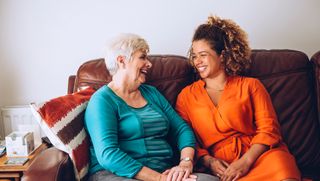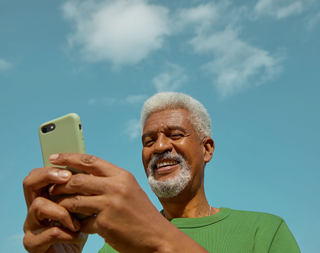Care for yourself as a carer
Practical tips for taking care of yourself when caring for others.


Summary
When caring for a loved one, it can sometimes be easy to let your own health fall by the wayside. Remember that your wellbeing matters too, and the better you look after yourself, the more you can be there for your loved one. Maintaining your well-being when caring for somebody else experiencing vision loss is important.
Here are some practical strategies and tips that may help.
Prioritise your health
It’s easy to become absorbed in caring for someone else and forget about yourself. However, you can’t pour from an empty cup. Prioritising your health starts with establishing a foundation of good habits. Try and consistently practice these habits – starting with small manageable steps and a strong commitment to a long-term goal. This will help you build a sustainable framework for your overall health and wellbeing.
Quality sleep
Aim for seven to eight hours of quality sleep each night to rejuvenate your body and mind. If sleep is challenging for you, try to establish some healthy habits that promote better sleep like going to bed and waking up at consistent times, ensure your bedding is comfortable and supportive, consider blackout curtains, earplugs or a white noise machine if needed for comfort and limit screen time usage at least one hour before bed.
Balanced nutrition
Eat balanced whole foods when you can. Nutritious meals are important for your energy levels and focus. Consider meal planning or meal-prep services if cooking becomes too much. Or look into options that can make mealtime more efficient like using online grocery delivery services or even an air-fryer for quicker cooking times.
Exercise and movement
Your physical health directly impacts your ability to care for others. Make time for regular exercise even if it's just a daily walk or a few minutes of stretching. Movement and exercise can help reduce stress, improve your mood, and increase your energy levels. If getting started is challenging, try and add some incidental movements into your day – like rolling the shoulders forward and backward as you’re seated, tilt the head to each side to stretch the neck muscles; and reach one arm across the body and use the other arm to gently pull it in. Gradually build up your movement as you can.
Manage your mental wellbeing
Remember to be kind to yourself. Caregiving can be hard and you may feel overwhelmed or frustrated at times. Consider using a planner or calendar to keep track of daily tasks, medications and appointments, and to prioritise what needs to be done. Try not to stress over things that can wait. Celebrate your successes no matter how small and forgive yourself when things don’t go perfectly.
To prevent burnout, seek some relief with regular respite care support when possible, and most importantly stay connected! Whether it’s your social connections, friends, support groups or online communities, it’s important to maintain social connections and have an outlet for your emotions with people who understand your experience.
SeeWay's Mental wellbeing support program is available for low vision carers with no out-of-pocket costs. With a mental health treatment plan, you can access sessions with our psychology partner onPsych either in person or via telehealth.
For more information
- Visit the Carer Gateway.
- Visit this article Learn more about SeeWay's Mental health support program.
- Contact Lifeline on 13 11 14, or Beyond Blue on 1300 22 4636 (available 24 hours, seven days a week).
- Always speak to your GP and eye care professional about the best treatment options for you or your loved one.
Remember your health is a priority, not an afterthought.
Did you find this article helpful?
Share your thoughts and help us make our resources better for everyone.
Enjoying the content?
Start building your profile to access personalised support, resources, and tools tailored to your eye health journey.
